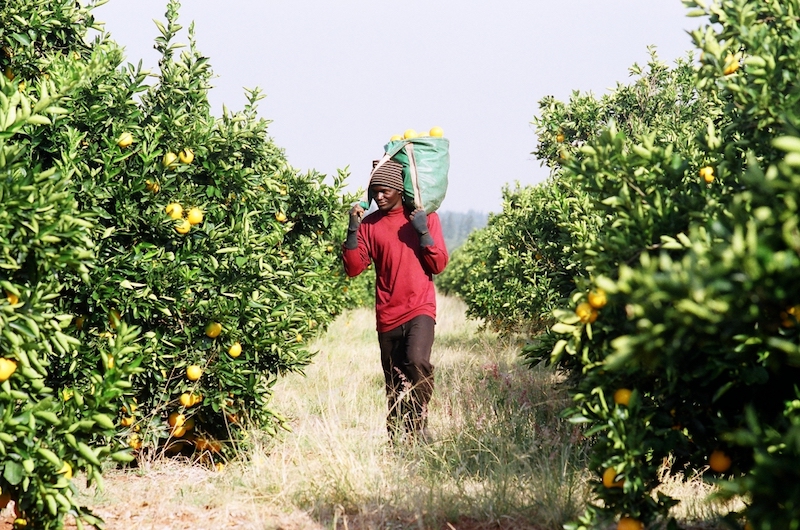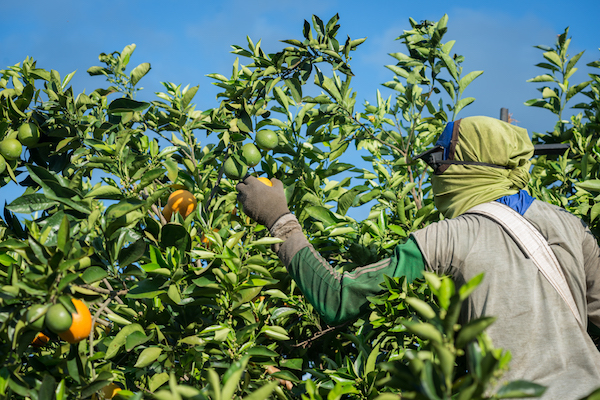
Implementing Best Practices to Reduce Health Risks
Currently, Mozambique imports up to 80% of its produce from South Africa. This is a missed opportunity on a number of levels. This level of import implies that Mozambique could potentially increase its capacity to produce safe food to be consumed nationally. This would reduce the quantity of imported produce, ultimately leading to growth of the country’s export capacity. To fight against the increase in non-communicable diseases, Solidaridad has co-created a multi-stakeholder platform with the objective to develop a fruit and vegetable standard that will enable more safe food production. Following this, a baseline study has been warranted to describe the fruit and vegetable farmers’ production system informing the team of the necessary intervention.
The initial finding showed that there was a knowledge gap among smallholders which saw farmers spraying pesticide one day and selling the produce the following day. This practice is harmful to the consumer and will over time cause direct danger to people’s health. Aside from the human health risk, the environment is also negatively affected with the excessive use of pesticides by farmers. The excess use leads to contamination of the water courses and soil, which in turn negatively affects the quality of the environment.
Quality Assessment Across the Country
The second point of engagement of this multi-stakeholder platform was the assessment of the quality of produce sold in the different parts of Mozambique. This was conducted through collecting fruit and vegetables from different sales points across the country, before sending them to Hearshaw and Kinnes Analytical Laboratory in Cape Town, South Africa. Here, the greens were tested through a ‘pesticides residue analysis’.
The results of the analysis revealed an abnormally high presence of pesticides residue on the sampled vegetables collected from roadside markets and other markets across Mozambique. On the basis of these findings, Solidaridad has, through involvement with different stakeholders, created a food safety standard called MozBoPa (Mocambique Boas Practicas). In order for the Mozambican government to institute this standard as part of the country’s Good Agricultural Practices, all market actors need to be on board. Their alignment would entail common success in building the country’s capacity for safe food production. This would involve getting buy-in from the government, farmers, chemical suppliers and retailers.
On the basis of these findings, Solidaridad has now created a standard called MozBoPa (Mocambique Boas Practicas). In order for the government to institute this standard as part of the country’s Good Agricultural Practices, all market actors need to be on board. This requires that, on our pathway to building Mozambique’s capacity to produce safe fruits and vegetables, we design a road map that is approved by the government.

First Pesticide Testing Lab in Mozambique
Beyond creating a framework that slowly moves towards national food security, Solidaridad will also be funding a testing laboratory to enable compliance to the MozBopa standard. Having a testing lab in the country means that any off-taker can make an informed and timely purchase decision by testing local produce. Robust infrastructure is one potential economic enabler. Previous practices revealed that sending produce across the borders for testing proved to be costly, both monetarily as well as in terms of time. The time range for receiving results from abroad testing was stretched to six weeks. This is not ideal when working with crops as sensitive as vegetables.
Vegetables are living organisms even post harvest. This means that the crop continues to ripen. This creates a quality disparity between the crop that is harvested versus the crop that the lab receives for testing. Bringing the testing service to the farms reduces the time range from six weeks to two weeks. This time reduction resolves a range of disadvantages that domestic farmers found themselves having. The lab will play a critical role in testing the quality of produce as we continue to improve farming practices throughout Mozambique.
Inculcating Good Agricultural Practices
All efforts to create a standard and setting up a testing lab would be futile if farmers aren’t informed on how to improve their farming practices. Paulo Sousa, Solidaridad’s Country Manager in Mozambique, attests to this. He says:
“Quality is as important as quantity. High quality fruits and vegetables must have a clear common procedure, sound and good practices, and a strong communication. These are important factors in creating a positive societal and health change in Mozambique. That is why we have partnered with AAU Technical, a local chemicals company that supplies the domestic market with pesticides to run training workshops for farmers in three provinces, Tete, Manica and Maputo.”
These workshops serve as corrective engagement with smallholder farmers, so they understand certain governing principles in the use of pesticide, these include understanding of sustainable use of pesticide, post-harvest intervals, etc. The first roll-out of these trainings is currently taking place in Angonia, with 20 smallholder farmers with a collective land pool of 19 hectares.
Close Food Monitoring to Ensure Food Safety By 2020
Solidaridad has imported 40 tonnes of certified potato seeds for a seed-multiplying project taking place in the Angonia district, (Nzusumire association) in central Mozambique. Each farmer received two tonnes of certified potato seeds per hectare, with a projected yield of 25 tonnes per hectare. Mozambique is one of the few countries in the region that can afford all year-round agri-production. The country has ample room for scale as only 15% of its 36 million hectares of arable land is currently being utilised.
Organizations such as Solidaridad are committed to support the government to monitor its own food production systems and assure its citizens that local produce has been produced in a safe way. This will inevitably have a positive ripple effect in reducing the volume of imported produce currently flooding the market. Additionally, it will increase inclusivity within the formal value chain and ultimately have a positive socio-economic impact. The goal is that be 2020, these measures will ensure that Mozambique is a food secure country.
Find out more about Solidaridad's work in East Africa here.
